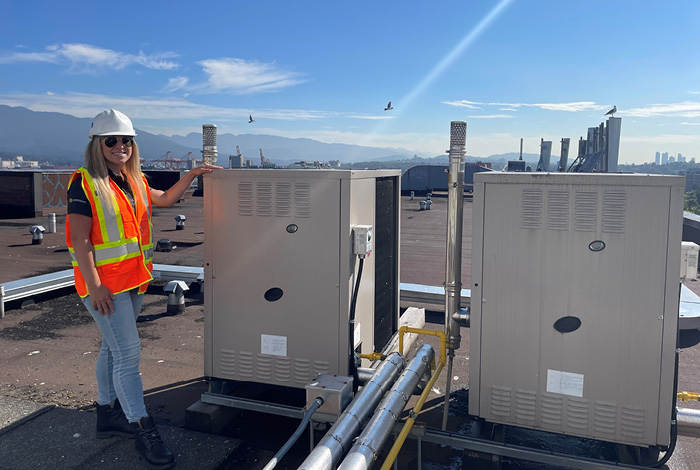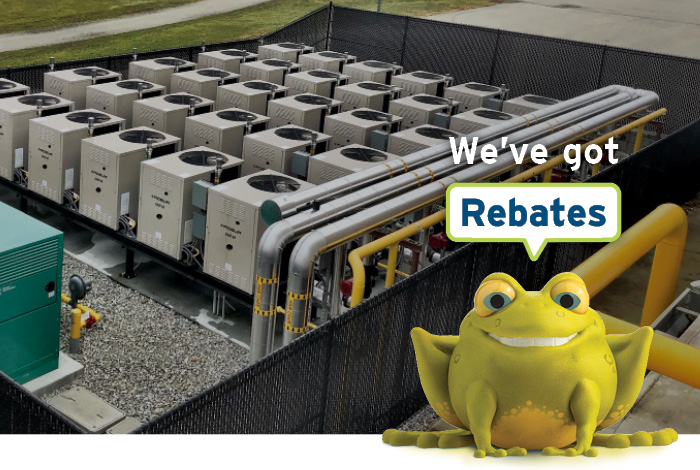What are gas heat pumps and how can they help save money and energy?
June 21, 2022
Update: November 12, 2024
What if there was a way to heat your building with technology that can be more than 100 per cent efficient without costly electricity upgrades?
Well, there is: gas absorption heat pumps. This technology can help commercial and industrial organizations lower annual operational costs and reduce energy use and overall greenhouse gas (GHG) emissions.
While this technology has been used in Europe for a couple of decades, it’s relatively new to the B.C. market so we wanted to test it out for ourselves. We ran a pilot program from 2019-2020 to test gas absorption heat pumps in seven commercial buildings across B.C., and then we surveyed pilot participants, the contractors who installed the equipment and consultants afterwards to see how they felt about it. The pilot demonstrated a 35 per cent reduction in energy use, and survey respondents all said they’d recommend the technology to others.
Curious about gas absorption heat pumps? We’ll answer the most frequently asked questions below and tell you how these heat pumps can achieve efficiencies of more than 100 per cent and ultimately help your organization’s bottom line.
What? I thought I had to switch to electric heating to use a heat pump.
No, you don’t have to make the switch to electric heating. Gas absorption heat pumps allow you to continue using the existing gas infrastructure in your building, like ductwork and piping. You can even opt into our Renewable Natural Gas (RNG)1 program. This reduces the amount of conventional gas being used, thereby further reducing GHG emissions.
How do gas absorption heat pumps work?
Similar to electric heat pumps, gas heat pumps capture heat from the outdoor ambient air and transfer it indoors for space and water heating. By transferring heat, a gas heat pump creates more than one unit of heat for every unit of energy it uses, giving gas heat pumps the ability to operate on average at more than 100 per cent efficiency.2
These units use the evaporation and absorption of ammonia and water to transfer heat. The evaporation causes cooling, and the absorption causes heating. The evaporation-absorption process creates heating and cooling while the condensation-evaporation process uses gas heat to reset the fluid conditions.
The ammonia-water absorption process was first patented in 1859 and has been widely used in refrigeration systems ever since. Ammonia is a natural refrigerant known for its high efficiency and low environmental impact. In gas absorption heat pumps, the water-ammonia solution circulates only within the refrigeration loop of the outdoor unit, while heat is transferred through water in a separate piping loop.
Is this technology new?
While it’s relatively new to B.C., and the first units in the province were installed for our pilot program, gas absorption heat pump technology has been tried and tested worldwide for more than twenty years.
“Many customers are initially unsure about gas absorption heat pumps because of how new they are to the North American market,” says Cameron Lee, a FortisBC conservation and energy management program specialist who’s focused on helping commercial and industrial customers save energy. “However, this technology has been around for the past two decades in Europe, and for the past five or so years in Asia.”
What are the benefits of installing a gas absorption heat pump in my building(s)?
There are a range of benefits that come with installing a gas absorption heat pump that can help you advance provincial climate action goals and put less pressure on your bottom line.
- Gas absorption heat pumps may reduce energy use by up to 35 per cent. They’re able to operate above 100 per cent efficiency, which can help your organization save money and energy year-over-year. Gas absorption heat pumps can also reduce emissions by up to 50 per cent when switching from standard-efficiency gas equipment like a furnace or boiler.4
- The units are designed to maintain optimal efficiency levels in colder climates. They can continue to operate when temperatures drop below -40 °C, making them a great option on the coldest days, even for customers in the B.C. Southern Interior and Northern B.C.
- Options to reduce emissions even more. To help organizations further reduce emissions and support provincial climate action goals, these units provide an opportunity for customers to designate up to 100 per cent of their energy as Renewable Natural Gas (RNG) to help lower overall emissions further. Manufacturers are currently researching the development of a burner that can operate on 100 per cent hydrogen, which could provide further emission reduction options in the future for customers using gas absorption heat pumps.
- Fewer building upgrades needed. The option to use gas absorption heat pumps allows business owners to continue using the existing gas infrastructure (like ductwork and piping) in their commercial and industrial operations. Moving to an all-electric system can be costly because of the potential infrastructure upgrades that may be needed to handle the increased energy demand. Instead, installing a gas heat pump allows our customers to significantly lower their building’s emissions and work towards climate action goals that may require fewer building upgrades than switching to electric systems.
How do you know gas absorption heat pumps can achieve these energy savings?
Before we release a rebate offer on a new technology, we put it to the test through a pilot program. In this case, we installed Robur A gas absorption heat pumps at seven commercial sites across B.C. The units were installed to serve the domestic hot water needs for the sites and our team measured the performance and efficiencies of the units from 2019-2020. In addition, we also consider the ease of installation and maintenance requirements for the units. We collected feedback from contractors and pilot participants to better understand how the technology is operating and if they’re satisfied with the performance of the units.

Mila Barbour, a member of our innovative technologies team, worked on a pilot project testing Robur gas absorption heat pumps in B.C. to see how well they performed in real-world settings.
At the end of the pilot, the results showed that organizations could achieve up to 35 per cent in energy savings. When surveyed, some contractors found that installing these units was similar to installing a condensing boiler, making it a somewhat familiar process, and clients reported having no complaints or interruptions to their domestic hot water.
More recently, we’ve been working with 13 organizations through our early adopters offer. These enthusiastic organizations are installing gas absorption heat pumps in their facilities, which include a healthcare centre, a university trade and technology centre, a number of multi-unit residential buildings and schools, a recreational centre and a fire hall.
We’re working with these organizations over the next two years to learn more about how this technology works within different building systems, continue to verify the energy savings and evaluate additional ways organizations can maximize energy savings.
“By testing these innovative gas absorption heat pumps, we’re helping advance this technology within the province and throughout North America, which we believe will give customers more high-efficiency choices for their homes and businesses,” Cameron says. “Customers can decide which option works best for their building and budget.”
Some customers who participated in the pilot told us that using a mix of energy sources in their operations was important for resiliency and energy security.
How can I integrate a gas absorption heat pump into my building’s existing systems?
Want to be sure a gas absorption heat pump is right for your building? We offer up to $20,000 in feasibility study funding for eligible customers. Visit our program page to learn how to apply.
Gas absorption heat pumps can be used in a variety of applications and buildings. Energy managers and consultants who were surveyed noted this technology is suitable for a wide range of commercial, multi-unit residential and institutional buildings, from office buildings, hotels and schools to hospitals, recreation centres, care homes and more.
How much does a gas heat pump cost?
Gas absorption heat pumps range in price and the units themselves can range between $20,000 to $25,000. However, factors like installation, piping, insulation, ancillary equipment (condensing boilers, buffer tanks, controls, etc.), structural inspections and craning (roof installations) will impact the total cost for a gas heat pump depending on the size and scope of the project.
If you’re interested in exploring how much a heat pump will cost, you can speak directly with a contractor who’ll be able to give you a more specific cost estimate for your building. You can find a licensed gas contractor through our Trade Ally Network.
Should I install additional equipment with a gas heat pump?
You can install one of the units on its own to serve the building’s domestic hot water, space heating and/or ventilation needs. However, this could be a good time to consider if any other equipment is nearing the end of its service life and if so, consider replacing it with a high-efficiency model.
To maximize energy savings, it’s best to think about how the building systems and controls work together. For example, by pairing a gas heat pump with a high-efficiency boiler or water heater, it can help optimize the heating load and you could see even more energy savings. Smart controls can also help ensure the system is operating effectively based on the energy demand.
Are there rebates available for gas absorption heat pumps?

Yes! Our commercial gas heat pump rebate program6 is available to customers with commercial, multi-unit residential and institutional buildings with a dedicated outdoor space either on the ground level or roof for the gas absorption heat pump units. Commercial customers can receive up to $200,000 in rebates depending on the scope of the project.
Who can I call for advice when starting my project?
We understand when installing a new technology, you may have some specific questions and we’re here to help you every step of the way.
Our key account managers and energy solution managers work directly with commercial and industrial customers and will help you throughout this process.
1Renewable Natural Gas is produced in a different manner than conventional natural gas. It is derived from biogas, which is produced from decomposing organic waste from landfills, agricultural waste and wastewater from treatment facilities. The biogas is captured and cleaned to create Renewable Natural Gas (also called biomethane).
2Coefficient of performance (COP) and gas usage efficiency (GUE) results of more than 1.0 were achieved in a Robur A gas absorption heat pump systems with dynamic controls, as recorded by Building Energy Solutions (BES) Ltd. in its Measurement & Verification report for the gas absorption heat pump pilot, phase 3 and 4, September 9, 2021.<
3The energy input into a gas absorption heat pump can be natural gas and/or Renewable Natural Gas.
4Standard efficiency equipment includes furnaces, boilers and water heaters that are between 60 to 80 per cent efficient.
5ASHRAE – position documents on refrigerants version 2020 and 2006.
6Participants must be a FortisBC gas customer under any rate class except Rate 1 and be an owner or long-term leaseholder of the existing commercial or industrial building. View full terms and conditions for the program on the program page.



